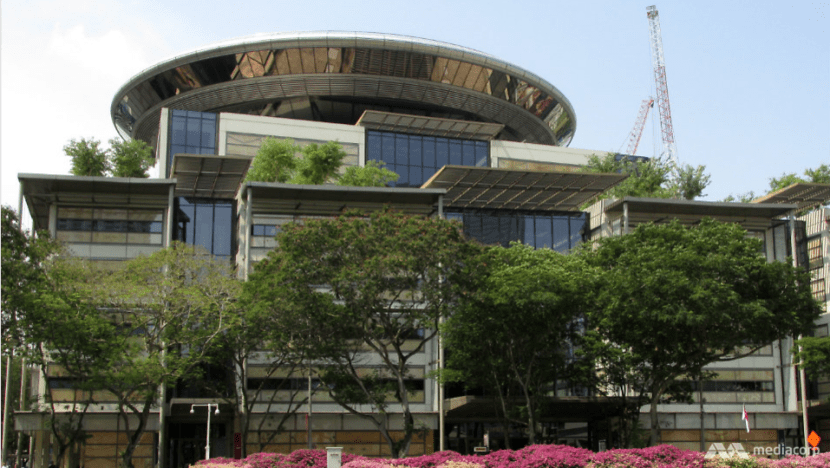Court of Appeal reduces jail time for man who raped a stranger's blindfolded girlfriend

File photo of the exterior of the Supreme Court in Singapore.
SINGAPORE: A man who was convicted of raping a stranger's blindfolded girlfriend in a "threesome" planned without the woman's knowledge in 2016 has had his jail sentence reduced after an appeal.
Srihari Mahendran, 26, was convicted after a High Court trial in 2020 and initially sentenced to 17 years and 10 months' jail and 14 strokes of the cane.
The Court of Appeal on Wednesday (Jul 6) reduced his jail term to 16 years and six months, citing the need for parity with his co-accused. His caning sentence was untouched.
Parity refers to the principle that people who commit the same offences should generally receive the same penalty, all other factors being equal.
In this case, Srihari's lawyer Edmond Pereira asked the Court of Appeal to reduce his client's jail term to 14 to 16 years to reflect his lower culpability and other mitigating factors compared to the co-accused.
Srihari's co-accused, the victim's then boyfriend, was sentenced to 19 years and 11 months' jail and 24 strokes of the cane on appeal.
The victim's boyfriend cannot be named to protect the identity of the victim. Srihari can be named as there is no gag order on his identity and he was a stranger to the couple.
Srihari and the victim's boyfriend met online in 2015 on a pornographic blog. Srihari agreed to fulfil the boyfriend's sexual fantasy of seeing his girlfriend have sex with another man.
In April and August 2016, without the victim's knowledge, Srihari snuck into two hotels where the couple were, and raped and sexually assaulted the woman with her boyfriend's help.
She became suspicious on the second occasion and removed her blindfold to see Srihari leaving the room. Evidence was also left in a video recording of one of the sexual encounters as the men filmed it.
The victim's boyfriend pleaded guilty, and testified against Srihari. Srihari failed in his defence at trial that he genuinely believed he had the victim's consent.
Srihari initially filed an appeal against his conviction as well, but Mr Pereira informed the court at the start of the hearing that his client had decided to discontinue that application.
APPEAL ARGUMENTS
Mr Pereira argued that Srihari was acting under the instruction and direction of the co-accused, who was the mastermind of the offences, to fulfil his co-accused's sexual fantasy.
He argued that although Srihari claimed trial to the charges, the victim was still spared from having to relive the experience by testifying in court, as he accepted her evidence instead of subjecting her to cross-examination.
An accused person who chooses not to claim trial is generally given mitigating weight in sentencing, as a guilty plea spares the victim from having to testify in court and is taken as an expression of remorse.
Mr Pereira also argued that Srihari admitted his role in the offences to hotel staff early on and even revealed his involvement in the first sexual encounter, which was then unknown.
In contrast, the co-accused lied multiple times to police and Institute of Mental Health psychiatrists at the start of investigations, even though he eventually pleaded guilty, said the lawyer.
He asked the court to give some credit to Srihari's "openness and forthright expression" of his involvement in the offences.
Mr Pereira also urged the court to consider that the co-accused was more culpable for the victim's vulnerability as he was the one who exposed the victim to the sexual encounters.
After listening to these arguments, Chief Justice Sundaresh Menon said he was unsure whether this could be treated as a "black and white" case where Srihari was given no credit for claiming trial, while the co-accused was given full credit for pleading guilty.
Deputy Public Prosecutor Ng Yiwen responded that what mattered was that the co-accused ultimately chose to plead guilty and admit to his offences, unlike Srihari.
He argued that giving Srihari credit for not calling the victim to testify would "unduly reward" him, as her testimony was neutral and irrelevant to his defence anyway.
He also told the court that after Srihari initially volunteered information to the hotel staff, the man went on to lie to the police as investigations progressed.
Mr Ng added that while the co-accused was the mastermind of the offences, Srihari helped to execute the plan and derived pleasure from it.
Justice Judith Prakash also commented that Srihari was an "enthusiastic participant" in the offences.
COURT OF APPEAL'S DECISION
Delivering the judgment on behalf of a three-judge panel, Chief Justice Menon said the court thought that "the parity principle was not given adequate expression and weight" by the trial judge.
In brief remarks, he said that the trial judge's decision on sentence was "unimpeachable" if looked at on its own terms.
But with regard to the difference in culpability between Srihari and his co-accused, the court found that Srihari's sentence was "not sufficiently differentiated" from that of his co-accused.
The court allowed Srihari's application and reduced his jail term by one year and four months.
Srihari has been out on bail pending his appeal. His sentence was deferred for two weeks at the request of his family, and will start on Jul 20.

















